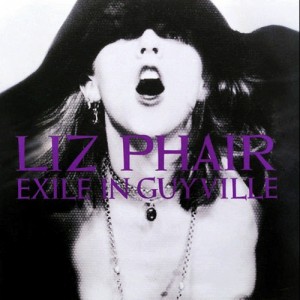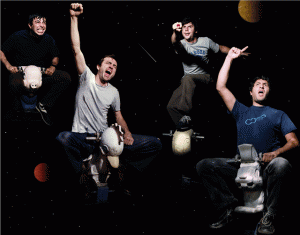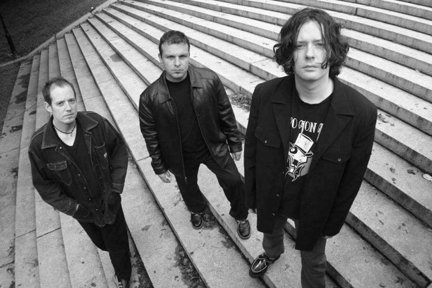THE RICHEST LINE in the song “Sex and Candy,” by Marcy Playground, goes: And there she was, in platform double suede / There she was, like disco lemonade. It is an easily hatable lyric in a terrible song about having a crush, the type of crush that’s borne of being drunk and non-specifically horny. You imagine that the guy never saw this beauty again, if indeed she wasn’t an apparition to begin with (Mama this surely is a dream, the chorus begs). It doesn’t even matter if he likes her—we don’t. She’s never even identified, and instead of exploring this ambiguity or really revealing anything about her[1], Marcy Playground leave it all alone. This places “Sex and Candy” among the worst of all the crush songs. The creative-writing teacher in me cries out for a more complete description: “You’re on the right track with ‘platform double suede’ and the olfactory image of sex and candy… give us more! Can we see her face? Her body?” Alas, not much more is forthcoming, unless you count the assertion later on that she is “like double cherry pie” and “like Disco Super Fly.”[2] (Maybe she has an enormous trenchcoat, which admittedly would go great with the footwear mentioned above.) Points off, by the way, for the lazy repetition of “double” and “disco.”
Throughout the history of pop music, people have sung about their crushes. Overwhelmingly the speakers of these songs have been by men extolling the object woman’s smile, curves, hair or eye color, way of dressing or some other distinguishing feature. Country songs, in particular, seem to lend importance to a woman’s height. We have grotesque body songs like “Bony Moronie” and others where a quirk is elevated to something like a fetish, such as The Who’s “Mary-Anne with the Shaky Hands,” in which the palsied girl is adored, above a number of other appealing candidates, by boys from every city.
Men also praise the way a girl walks and dances. Famously, her corset measurements become a matter of public record and cause to brag about her, with “36-24-36” and the many parodies thereof (see references in “Baby Got Back” and elsewhere). Given the facts of biology and sociology, it may be discomfiting, but not surprising, that men should express themselves this way—the variety is as wide and as impressive in music as human variety is in real life.
 Men, however, aren’t the only ones to get smitten; women speakers have a wealth of physically descriptive songs under their collective belt too. Some are subtler, as when Joni Mitchell mentions “the red, red rogue” who sold her camera after being her lover in Greece; some overt, like Salt-n-Pepa’s rapture over the man in “Shoop” including (and with a fair amount of attention paid to) his nice butt. Sleater-Kinney’s “One More Hour” comes on to a woman by discussing her dress and pretty shoes and saying, ardently, You’ve got the darkest eyes I’ve seen. Liz Phair sings about the lips and eyelashes of her beloved in the lascivious “Supernova” and, to return to the subject of height, envisions a taller and happier version of herself in “6’1.”
Men, however, aren’t the only ones to get smitten; women speakers have a wealth of physically descriptive songs under their collective belt too. Some are subtler, as when Joni Mitchell mentions “the red, red rogue” who sold her camera after being her lover in Greece; some overt, like Salt-n-Pepa’s rapture over the man in “Shoop” including (and with a fair amount of attention paid to) his nice butt. Sleater-Kinney’s “One More Hour” comes on to a woman by discussing her dress and pretty shoes and saying, ardently, You’ve got the darkest eyes I’ve seen. Liz Phair sings about the lips and eyelashes of her beloved in the lascivious “Supernova” and, to return to the subject of height, envisions a taller and happier version of herself in “6’1.”
Girl groups of the Sixties—often but not always in songs written by men—have their say in describing, for instance, the “Boy from New York City” in his mohair suit. Is he tall? one of the other Shangri-Las asks Mary Weiss in “Give Him a Great Big Kiss.” Well, Mary replies, I gotta look up. (In other words, he’s not that tall, but she is still into him.) And, in a stroke of true genius, Dolly Parton creates an ivory-skinned, green-eyed, auburn-haired vision that the lovelorn speaker obsesses over as much as her man does, turning jealousy into admiration and back again.[3]
Of course, there are plenty of great love songs where physical description is vague or absent. For pity’s sake, does it matter what the girl’s hand looks like in “I Want to Hold Your Hand”? Pete Shelley was not public about his bisexuality when the Buzzcocks recorded “Ever Fallen in Love?,” which many conjecture is about a man and hence necessarily vague; while no physical details exist in the song, it is an exquisitely frantic and emotive second-person lament. In the wistful “Her Name Is…,” George Jones uses his guitar talkbox to elide the identifying info about his secret girlfriend.[4] And there are countless songs that just proclaim their muse as “beautiful” or “sexy” or “sweet,” with no further stats given—so that you, the consumer, can listen and think of your own sweetheart, whatever their appearance.
OK, so is “Sex and Candy” really that bad? It’s openly acknowledged that the action could be taking place in a dream, so it should be fine to leave certain descriptors out. Plus—and I state this passionately—a good song does not have to make any sense at all. What bothers me is that both the situation and the woman seem false, like a construct of a woman not actually desired by the speaker of the song, but designed to be desired by all the other idle douchebags who likewise find themselves hangin’ round downtown by myself. Platform Double Suede, in her generic trendiness, is similar to the soulmate in “Hey, Soul Sister” by Train, who is seduced by shitty Eighties songs and who doesn’t even care that the guy chooses not to shave his chest.[5] I guess a lot of people must be into that, I end up thinking, but to me she sounds horrible. He and she both do, come to think of it, and they deserve each other.
 The same thing happens with the song “Turn a Square” by the Shins, wherein the supposedly captivating girl shows up “wearing tennis shorts made of stripes” and proceeds to turn her observer, by his own admission, into “a walking cliché.” He also refers to her as “a well-made lock”; that is, he synecdochizes her vagina, which is the creepiest thing you can possibly do in a jaunty indie-rock track. Instead of a proclamation of titillation, I smell sex and candy here! strikes me as something you’d say in disgust when walking into a bad all-ages club.
The same thing happens with the song “Turn a Square” by the Shins, wherein the supposedly captivating girl shows up “wearing tennis shorts made of stripes” and proceeds to turn her observer, by his own admission, into “a walking cliché.” He also refers to her as “a well-made lock”; that is, he synecdochizes her vagina, which is the creepiest thing you can possibly do in a jaunty indie-rock track. Instead of a proclamation of titillation, I smell sex and candy here! strikes me as something you’d say in disgust when walking into a bad all-ages club.
But that’s just me. Regardless of the venom with which we snobs hate or disdain Marcy Playground’s hit and tunes like it, many such songs have enjoyed immense popularity, and that must be respected. To say nothing of the nostalgia wave that jolts you back to 1997 or whatever year the hit in question broke, they have entertained millions, thus satisfying a pop song’s primary requirement. I just hope the song’s popularity does not imply that Marcy Playground describe any overarching ideal of a crush that everyone would love to meet, but rather, the concession that crushes are often a big mistake. As the douchey, unlikable strains float from a car window or a supermarket PA and fill our ears, God knows we’ve all been there.
[1] How great would it have been if lyricist John Wozniak had slyly suggested that this might not be a woman, the way Ray Davies did in “Lola” and, before that, “Party Line”?
[2] Marcy Playground’s primary cultural contribution is the coining of this phrase. No part of the film Super Fly takes place in a disco, though its theme song by Curtis Mayfield was played at discos.
[3] While we are doing this obsessive High Fidelity-esque song curation, my top 3 songs about sexual jealousy are: “Jolene” by Dolly Parton, “I Want You” by Elvis Costello, and “It Wouldn’t Have Made Any Difference” by Todd Rundgren.
[4] Although, come on, it’s tough to imagine the guitar is saying anything but “blue” and “five foot two.”
Check Out Our Latest Weeklings Playlist: Songs About Crushes
http://open.spotify.com/user/joed_sandiego/playlist/2ysCzSwidZwjvoP6FwvbBz




“It doesn’t even matter if he likes her—we don’t.”
Lovely exploration, Amanda. Like platform double suede.
One line in Supernova goes “…and you fart like a volcano…” – if you want it to.
I think that rock music is a lot better at evoking feelings of lust and obsession than in actually describing romantic love. Songs like “Peggy Sue” or “Layla” are about the way the woman makes the singer feel; the woman is barely present, and the lyrics would be considered banal if you removed them from the context of the song and the performance.
You identified the biggest problem with “Sex and Candy” when you used the word “douchey” to describe the lead singer’s persona in the song. Some songs just sound like the singer is strutting into a singles bar wearing gold chains and cheap cologne. That’s what makes a lot of lesser lounge singers sound so ridiculous too.
I had never realized that Pete Shelley’s bisexuality was in doubt. I had always assumed that the song “Homosapien” was a not particularly veiled reference to his sexual orientation.
Wow you must be a genius! Your not even close to the “meaning” of this song….hope this isn’t your career to write this bullshit because my 10 year old could’ve done a more accurate depiction nice try though.
It’s a great song and your analysis is extremely pompous and condescending.